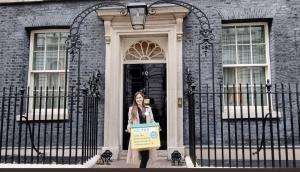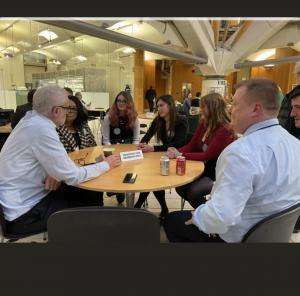Truth to power - a care experienced campaigner's journey to Number 10

Published by Professional Social Work magazine, 4 February, 2022
When I think about my time in care, the first word that springs to mind is ‘loneliness’. No matter where I was, or how many people I was with, I always felt isolated. This was especially true between the age of 16 and 17, when, after sofa surfing for months, I was placed in a hostel.
On paper, I should not have felt lonely – I was one of 38 in the facility. But the reality was quite different. I must have spent thousands of hours alone behind that door. I was one of maybe three or four children who lived there at any given time. The rest were adults, the oldest being 25, and some were known to the police. I locked myself in my bedsit as a coping mechanism.
For this reason, being part of the care-experienced delegation to deliver the #KeepCaringto18 petition to Downing Street was so significant. Any lingering sense of isolation, or of not being heard as a care-experienced person, was gone.
In fact, if anything, I felt surrounded by support. I could not quite comprehend that 10,700 people had spoken up for our community, by signing up to Article 39’s #KeepCaringto18 petition.
I realised that this was the first time in my adult life that I had been in a majority care-experienced group. I had become accustomed to feeling different from others at work, university or with friends. For once, though, I belonged.
It is often said that care-leavers are a substitute family for one another, and I never really understood this until the day. Within minutes of meeting outside of Westminster station, there was an electric sort of synergy among the care-experienced delegates, and I felt a connection I could not quite explain.
The day was marked with a real sense of camaraderie. At around 12.45pm, we walked over to Parliament Square – a spot I knew well by sight from the news. As delegates, we were there to talk to journalists about the importance of the campaign, and to share our stories.
Without having planned it, we formed a small circle on the grass verge, sharing words of advice and encouragement. There was a real sense of solidarity, of looking out for the collective, and of being part of something bigger than ourselves.
Following this, we made our way to the London Eye as a symbol of taking the petition to the sky. When I looked across the horizon, where chrome buildings gave way to leafy suburbs as far as the eye could see, I was reminded of the scale of this campaign.

I was deeply conscious we were representing children and families from diverse backgrounds across the country - some who might never hear of policies which so drastically impact the trajectory of their lives.
Once we descended and headed toward Downing Street, I found myself in conversation with another care leaver, who, though separated by distance and age, had remarkably similar experiences to myself. I was eager to listen, perhaps slipping into social worker mode. But when it came to sharing my story, I hesitated at first - it felt so alien to be vulnerable.
I am not well-versed in sharing my story. At least not verbally. I tried to do in writing in my recent journal paper, which looks at diary entries I wrote in a care-less setting. For the record, this would once have been called an unregulated placement – but now, the government is regulating the absence of care in these settings. It is an example of how government bends language to feign progress, whilst failing to address issues at all.
But back to the moment. After a lifetime of guarding my story, sharing did not come easily. The stigma I had faced in previous settings, such as university, taught me sharing was not always in my best interest. But as I did so, I realised that I was reclaiming it as something to be proud of.
Once we arrived at the gates, we were warmly greeted by Emma Lewell-Buck, MP for South Shields, and Lilian Greenwood, MP for Nottingham South, who treated us as though we really meant something. It is a reception our community should expect, but one which, if I am honest, felt rather unexpected.
Approaching Number 10 itself, I felt something akin to imposter syndrome. It is something I am used to as a care-experienced, younger woman with a regional accent in a female majority, but male-led profession. But this was next level.
Who am I of all people to be here, when this same pavement has been walked on by royalty, world leaders, and politicians over the ages? I thought.
But as I looked around at the delegation, I quickly got over it. We deserve to be here, I thought. It should be an honour for Number 10 to welcome care-experienced people, not the other way round.
When a government representative cracked open the door to receive our petition, I could not help but peer inside. I was met with lavish décor, fine paintings, and gilded ornaments.
The contrast between that place and the hostel I had lived in was sickening – not a pretty word, but I cannot think of a more fitting one. It highlighted why our community must infiltrate such spaces, to set the record straight about the state of things in the real world. So too must social workers.
Unlike politicians, we live, breathe, and witness the impact of an underfunded system on the lives of those we support. A single week can take us to hospitals, homes, prisons, secure units, and schools. We are immersed in diverse communities unseen by politicians.
The experience brought home the power of activism – of mobilising together, and not just accepting the unacceptable (and by the way, BASW branches and special interest groups are a great place to start).
As the day drew to a close, we went to parliament to enjoy a well-earned brew and biscuit. We met children’s commissioner Rachel de Souza, who said she appreciated the passion behind the campaign. Later, she tweeted a photo with us which read: Good to meet Article 39 and care leavers in Parliament after they had presented their petition on caring to 18 to No10. We need to care for children in care to 18 and beyond as we all do for our own children.
It is shameful that we live in a society which does not. How can it be right that 22 children died in care-less settings from 2018-2020, yet private companies running them are afforded greater protection than children living there.
Looking back on my lived experience as a social worker, it defies belief that a 16-year-old can be left alone in a bedsit – the risks are obvious, including child sexual and criminal exploitation, domestic abuse, and county lines to name a few.
And why is there such an unhealthy obsession with moving children in care toward independence? The non-care experienced population leaves home aged 24.6 on average. A parent’s love toward their child knows no deadline – it should be no different for children looked after.

This was something we spoke to at length with Jeremy Corbyn, whose tea-break we ambushed after we spotted him from across the cafeteria. Over the course of 40 minutes, he took the time to truly listen to our experiences of care-less settings. I told him that the lack of supervision was so potent that once, no one knew I was in hospital until I had been gone four nights. Others shared similar painful, deeply personal accounts.
All in all, a historic day – I was proud to represent the care experienced community at the heart of parliament. Nor could I have felt more supported by Article 39, the #KeepCaringto18 steering group, or petition-signers. But it was bittersweet, because I wish it was not necessary at all.
